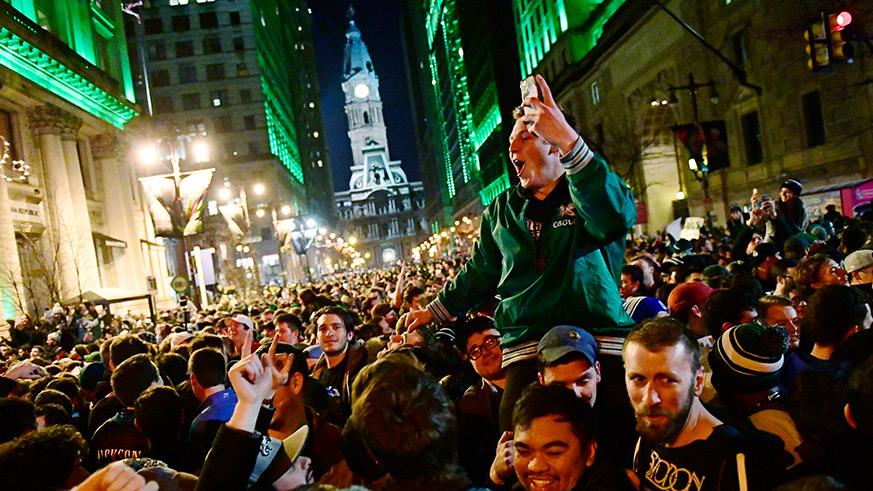Faith, Family, Friends, and Football

Philly fans celebrated together after the team's first Super Bowl victory. Courtesy of Metro US

By Rev. David M. Friel, Graduate Student
It resembled a Corpus Christi procession, I admit. As the Lombardi Trophy was processed toward the on-field altar, pious congregants fixed their gaze upon its radiance. Some stretched out their arms and hands, as though hoping power might flow out from the object of their worship. A privileged few reverenced the icon with a kiss. Jeffrey Lurie raised the medicine of football immortality high, as if in benediction. All that was missing was a humeral veil and the Blessed Sacrament.
Celebrations erupted remotely in the City of Brotherly Love. Figured prominently in the coverage of this revelry were the shattered windows, downed light poles, and vandalized vehicles along Broad Street. These excesses, however, were not at the fore for most of the thousands who stood in the streets throughout the city. Grassroots evidence tells me that the center of the Super Bowl festivities, for most Philadelphians, was family.
During a radio interview the next morning, a local woman spoke about her brother who died at age 28, three weeks after the Eagles’ last Super Bowl appearance in 2005. She described the mysterious healing effect of this victory on her 13-year-old grief.
An 18-year-old man who took his 99-year-old grandfather to watch the game live in Minneapolis spoke about their shared Eagles fandom as an opportunity to foster communion among generations.
The morning of the game, parishioners told me after Masses about their sons, daughters, nieces, and nephews who would be crowding their homes later in the day for a family feast and communal watch party.
Folks I know who filled the intersection at Frankford & Cottman that night said they went there not to riot, but to express a very real sense of community.
I am slow to discount such testimonies.
My dad grew up in the Germantown section of Philadelphia. He was a lifelong Eagles fan— the sort who watched games and quoted statistics without making a religion of it. He was not a great athlete, but he introduced me to the Eagles and cultivated within me a love for all sports. He enjoyed (the rare occasions) when my siblings and I won games and championships, but he was much more proud of our willingness to try a new sport and play it to the best of our ability. Watching Super Bowl LII with my Dad would have been a thrill. Since his death three years ago, I have become increasingly grateful for the times we shared playing and watching sports. From playing catch in the backyard to the Phillies’ World Series triumph, from shanks and slices at the driving range to Sunday’s back nine at the Masters, so much of our relationship is bound up with the union we forged through sports.
I spent Super Bowl weekend in Philadelphia, partly in order to share the game with a group of brother priests. No fires were set, and no light poles were climbed. Albeit far from the deepest connecting link shared among us, our mutual love for Eagles football nevertheless contributes something real to our camaraderie as men committed first and foremost to Christ.
We endured apprehension and anxiety, exhilaration and jubilation during the course of the contest. We high-fived and hugged, broke bread, cheesesteaks and tomato pie actually, and sang the fight song. The positive effects of the gathering were similar to what I gained from watching sports with my dad in years gone by.
On account of classes here at CUA, I was not able to stay in Philly for the parade. Driving back to D.C. the Monday after the victory, what filled my mind was gratitude. My heart was flooded with thanksgiving for family and friends who have taught me to enjoy the gift of sport in right relationship to all the manifold goods of this world. Were it not for my father, my family, and my friends, the Eagles’ Super Bowl victory would have been the cause for only very limited celebration. But, on their account, it became so much more than simply an Eagles’ win.
Does football sometimes compete with faith and family life? Certainly. But can it also contribute?





